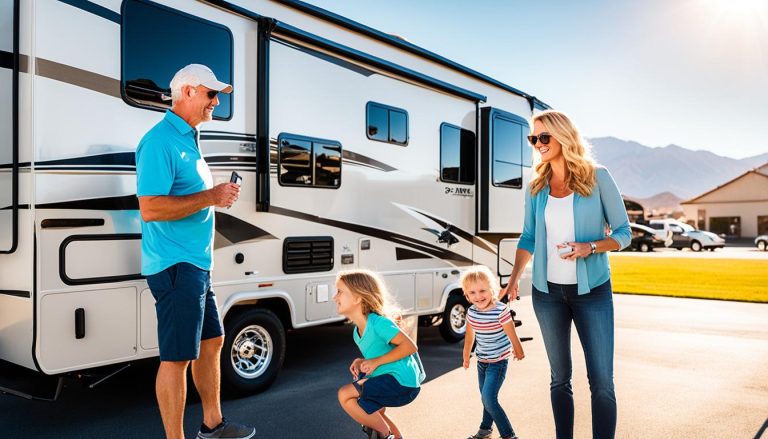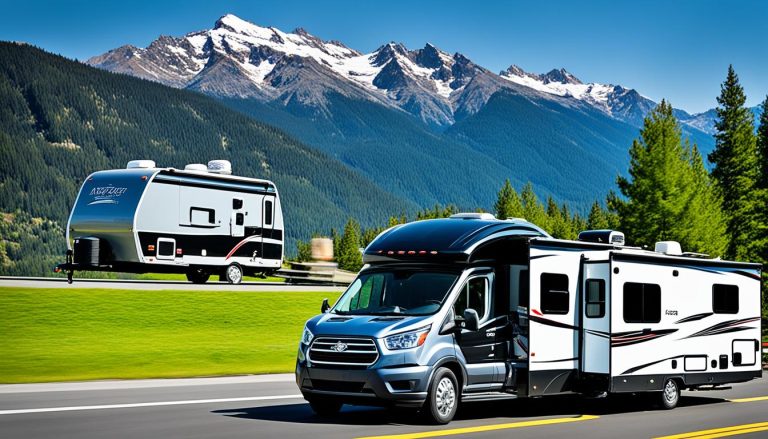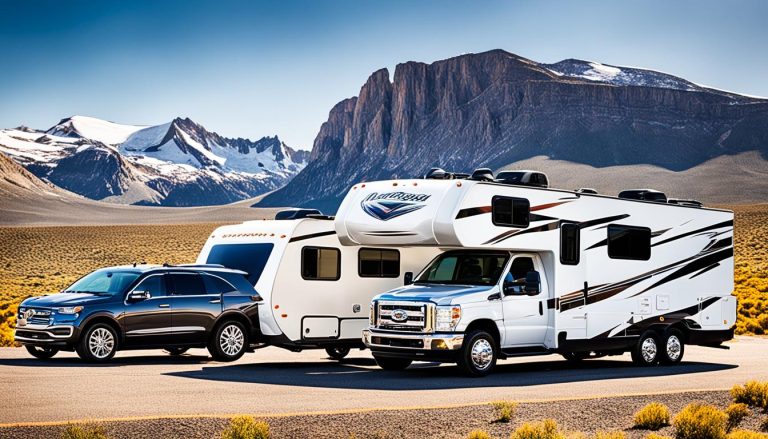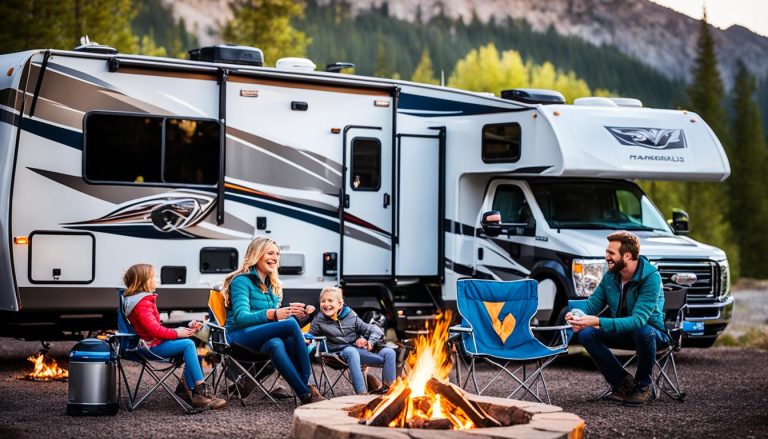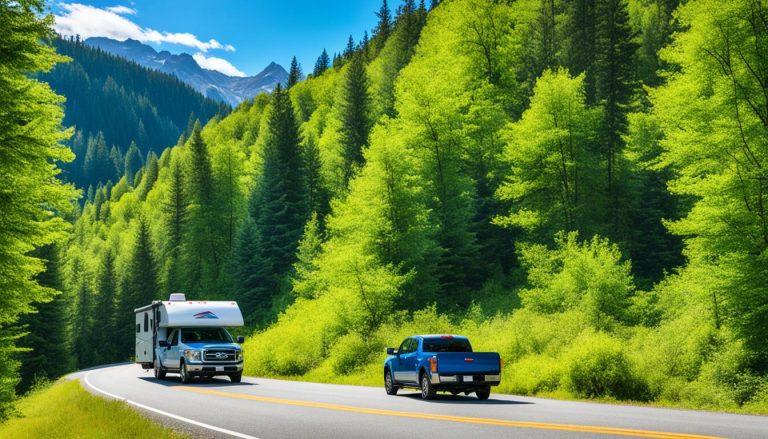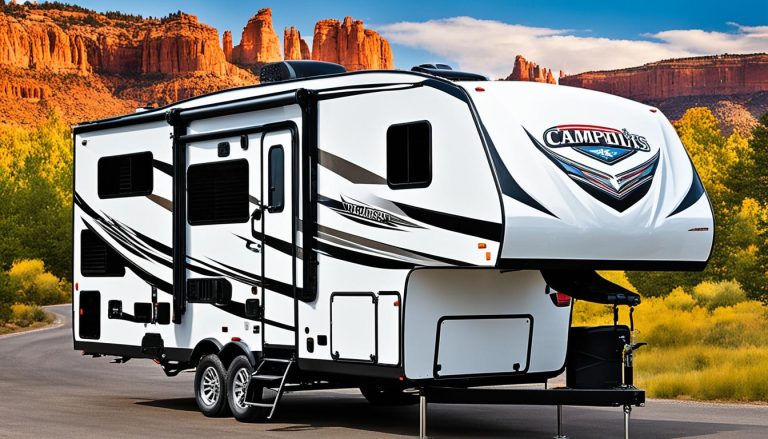Troubleshooting Common Towable RV Problems
gorvlifestyle.com and its partners may earn a commission if you purchase a product through one of our links
For many adventurers, a towable RV is the gateway to freedom and exploration. However, the open road can also bring about a myriad of RV maintenance issues and trailer repair challenges. Understanding how to navigate the common towable RV problems is crucial for anyone who values uninterrupted journeys. Between tackling recreational vehicle technical difficulties and applying camper troubleshooting tips, RV owners can find joy in both the destination and the ride.
Adventures are seldom without their hiccups, and even the most meticulously maintained RVs can encounter bumps along the way. Whether it’s dealing with erratic air conditioning, plumbing woes, or a sudden tire blowout, the key is preparedness and knowledge. With this guide, owners are empowered to address the regular wear-and-tear with confidence, ensuring their home on wheels remains a symbol of endurance and fun.
Key Takeaways
- Proactively handling RV maintenance issues prevents on-the-road headaches.
- Addressing trailer repair challenges timely can spare costly visits to the service shop.
- Knowing how to troubleshoot recreational vehicle technical difficulties adds to the ownership experience.
- Being aware of common towable RV problems equips travelers for smoother trips.
- Applying camper troubleshooting tips can extend the life and enjoyment of the RV.
The Significance of Preventative Maintenance for RV Longevity
For any recreational vehicle enthusiast, understanding the importance of preventive maintenance is key to guaranteeing the ongoing performance and longevity of their investment. It’s not just about tackling RV maintenance issues as they arise; it’s a matter of regular upkeep to prevent common towable RV problems from ever occurring. Engaging in punctual inspections and servicing can spare RV owners a deal of technical hassles and financial burdens down the road.
Preventive efforts extend beyond the superficial; they delve into the systematic care required to combat recreational vehicle technical difficulties. By adopting a routine that habitually assesses and rectifies minor quirks, RV owners not only avert imminent breakdowns but also contribute to the overall well-being of their mobile abodes. A detailed preventive maintenance checklist ensures that every component, from brakes to batteries, remains in prime condition.
- Inspection of seals and seams for leaks
- Checking tire pressure and tread depth
- Testing battery life and cleaning connections
- Examining brake systems and fluid levels
- Assessing suspension and wheel bearings
- Regular maintenance of HVAC systems
- Verification of lighting and electrical systems
Moreover, owners with a good grasp of troubleshooting can solve minor glitches swiftly, thereby reducing the need for costly visits to the repair shop. However, when confronted with significant RV maintenance issues, a robust extended service plan can serve as a financial buffer against the expense of complicated repairs, adding another layer of security to the preservation strategy.
| Component | Regular Check-up | Benefit |
|---|---|---|
| Roof and Sealant | Every six months | Prevents leaks and structural damage |
| Tires | Before every trip | Reduces risk of blowouts and improves fuel efficiency |
| Battery | Biannual testing | Ensures reliable power supply and start-ups |
| Water System | Seasonal flushing | Avoids clogs and maintains cleanliness |
| Appliances | Annually | Prolongs lifespan and functionality |
Ultimately, the cornerstone of responsible RV ownership is the implementation of a comprehensive preventive maintenance routine. It’s an invaluable practice that not only shields against the unpredictability of common towable RV problems but promotes a safer, more enjoyable, and untroubled travel experience. After all, the adventure should be in the journey, not in unexpected technical mishaps.
Common Towable RV Problems and DIY Troubleshooting Tips
For many RV enthusiasts, navigating through the myriad of RV maintenance issues can certainly dampen the spirit of adventure. However, being equipped with a set of camper troubleshooting tips and knowing some DIY RV repairs can transform these common towable RV problems into minor hiccups on the road to exploration.
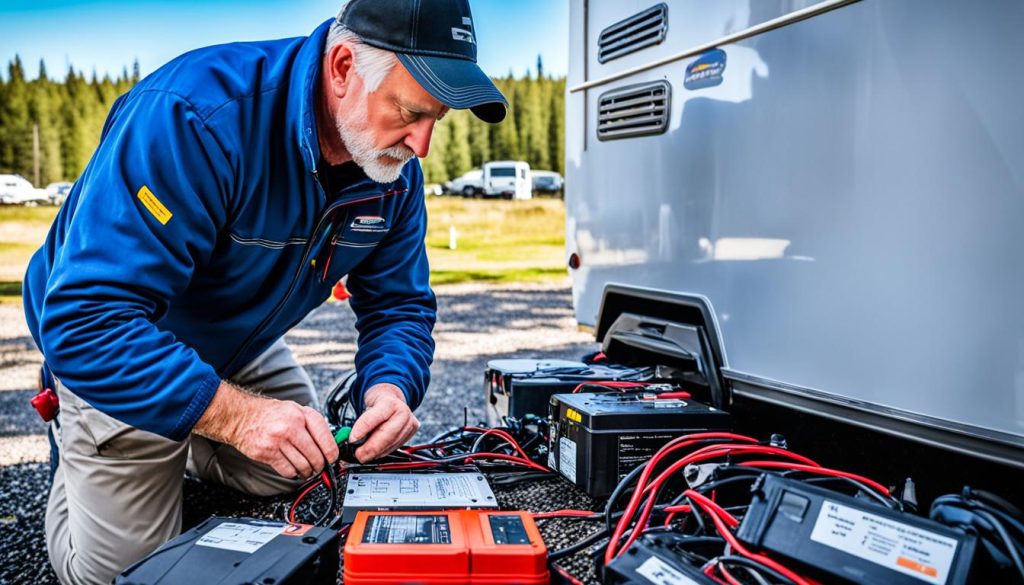
Air Conditioning Challenges: DIY Fixes for Common Cooling Issues
A well-functioning air conditioner is a godsend during long trips, especially in the heat of summer. Yet, many RV owners face trailer repair challenges stemming from cooling system glitches. A proactive approach, involving cleansing AC filters and shrouds, can prevent most issues. However, when your RV’s AC starts misbehaving, it’s often due to accumulated debris affecting air flow or more severe thermostat malfunctions. At the first sign of trouble, investigate the condenser and evaporator coils and consider a rigorous cleaning to improve efficiency.
Plumbing Perplexities: Solutions for Water and Toilet Systems
The less glamorous side of RVing involves dealing with plumbing issues. Clogged wastewater tanks and toilets are the all-too-common plagues of the RV world. Continuous sewer connection or excessive dumping are usual trailer repair challenges and can be managed through household snaking, albeit with caution to prevent harming the plumbing system. In the case of leaks, timely intervention is crucial for preventing extensive water damage.
Electrical Enigmas: Safely Addressing Power Problems
Electrical faults can make or break an RV trip. From flickering lights to an unresponsive microwave, these issues hint at an underlying RV maintenance issue. DIY enthusiasts can approach common problems by checking for loose connections or tripped breakers. However, when electrical conundrums escalate beyond simple fixes, it is wise to consult a professional to avoid jeopardizing your RV’s electrical system or your safety.
DIY RV Repair Tips at a Glance:
| Problem Area | DIY Repair Tip | When to Call a Pro |
|---|---|---|
| Air Conditioner | Regularly clean filters and check coils for debris. | Malfunctioning thermostat or Freon levels are of concern. |
| Plumbing | Use snaking techniques; avoid harsh chemicals. | Leakage or persistent clogging despite efforts. | Electrical Systems | Check for loose connections; reset tripped breakers. | Comprehensive wiring issues or repeated fuse blows. |
While encountering maintenance issues with common towable RV problems may be daunting, many situations are manageable with the right troubleshooting tips. Whether it’s preventative maintenance or an unexpected repair, a responsible DIY approach can often save the day, leaving the open road just a quick fix away. Yet, always remember that certain trailer repair challenges and deeper technical difficulties are best addressed by certified professionals who can ensure your travel home remains safe and sound for all your adventures.
Camper Troubleshooting Tips for On-The-Road Repairs
Embarking on an RV adventure brings the promise of freedom and fun, yet it’s important for enthusiasts to be well-equipped with knowledge on handling RV maintenance issues and common towable RV problems. Roadside hiccups can occur despite meticulous planning, therefore having a basic understanding of trailer repair challenges and securing roadside assistance plans is essential for a stress-free journey.
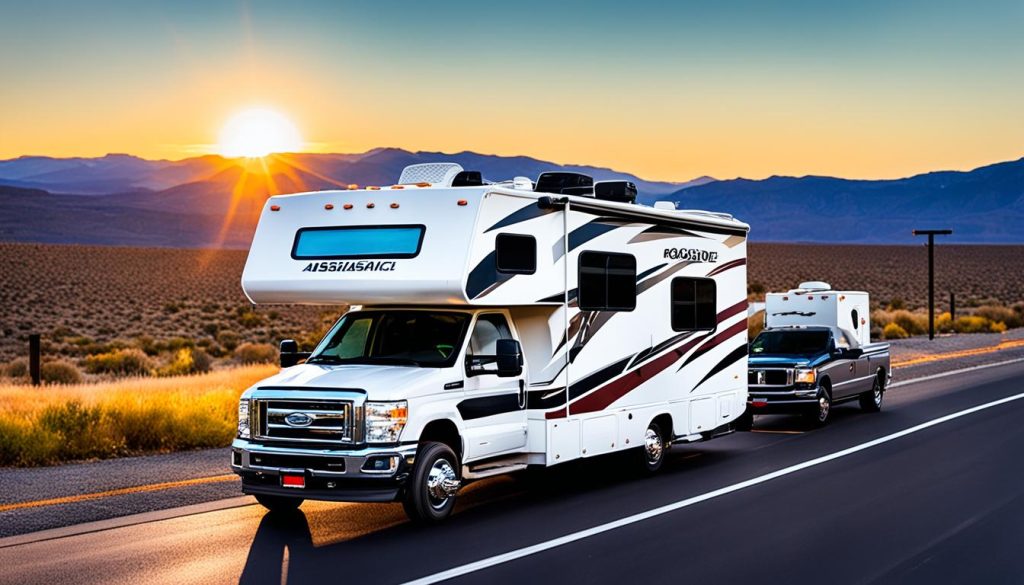
Before hitting the road, RV owners should initiate proactive measures to evaluate the rig’s condition. This includes:
- Verifying weight distribution to avoid overloading
- Scheduling wheel-by-wheel checks for tire integrity
- Inspecting wheel alignment to prevent uneven wear
- Ensuring the suspension system is functioning properly
In the untimely event of tire or wheel damage, having a comprehensive roadside assistance plan can be the dividing line between a massive setback and a minor inconvenience. These services often encompass:
- Towing to the nearest repair facility
- Changing tires on the spot
- Assisting with mechanical failures
Remember, consistent RV upkeep not only prolongs the life of your recreational vehicle but also solidifies your safety and enjoyment on the open road. Investing time in routine trailer checks greatly diminishes the risk of running into common RV pitfalls.
Resolving Tire Issues for a Smooth RV Journey
Ensuring a seamless RV journey starts from the ground up, with tire maintenance playing a pivotal role in promoting road safety and comfort. RV maintenance issues can often be traced back to overlooked tire care, which is why recognition and prevention of potential trailer repair challenges is crucial.
Predicting and Preventing Tire Blowouts
Common amongst recreational vehicle technical difficulties, tire blowouts are often the result of tires that have succumbed to the pressures of excess loading. To counter this, RV enthusiasts must prioritize tire health through diligent inspection and proper inflation. Here’s what you can do to prevent unwelcome stops on your adventure:
- Regularly check and maintain tire pressure to manufacturers’ recommended levels to ensure they can handle the load.
- Examine tires for signs of wear or damage before embarking on a trip and routinely during travel.
- Equip your RV with a quality spare tire, ensuring it’s in excellent condition—it could be a day saver.
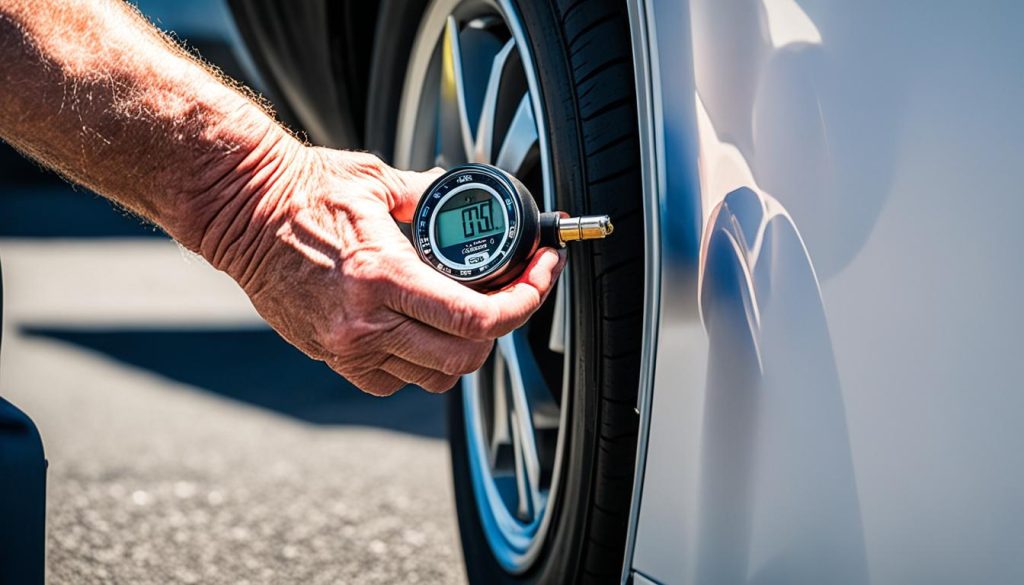
Handling Alignment and Suspension Troubles
Not just a matter of tire integrity, the alignment of your recreational vehicle has significant impacts on everything from handling to fuel economy. Recognizing common towable RV problems related to misalignment can save you from costly repairs down the line. Symptoms like uneven tire wear and a shaky ride can signal that it’s time for professional attention. Services to improve and repair your RV’s alignment and suspension will ultimately extend their lifespan and maintain your vehicle’s performance on the roads.
- Have wheel alignment checked periodically, especially if your RV begins to exhibit poor handling.
- Be mindful of the vehicle’s weight distribution; overloading can prompt tire and suspension issues.
- Respond fast to any warning signs like vibrations or pulling to one side, as these are often indicators of deeper technical problems.
The key to addressing both tire and suspension woes is to integrate these checks into your overall RV maintenance routine. This will not only enhance your RV’s reliability but ensure a safer and more enjoyable cruising experience.
Strategies for Avoiding and Repairing Water System Faults
Regular RV maintenance and thorough understanding of your vehicle’s water system are essential in preventing and addressing common water system faults. RV owners are all too familiar with the inconvenience of pump issues or pipe leaks, especially after long storage periods. To avoid such RV maintenance issues, it is crucial to take proactive steps to mitigate potential water system faults. Here are some insightful camper troubleshooting tips designed to keep your water flowing and your trips smooth.
Winterization: One crucial preventative measure is winterizing your RV’s water system. By fully draining the system and employing antifreeze designed for RVs, you can avert the freezing and bursting of water lines that lead to costly repairs.
Regular Inspections:.Performing frequent inspections for signs of wear or damage can prevent minor issues from escalating into troubling common towable RV problems. Areas that often require attention include pipe connections, hoses, and the water pump itself.
Quick Response: In the event of a water system malfunction, swift action is your best ally. Promptly locating and fixing leaks not only prevents further damage but also conserves water—a precious commodity on the road.
| Preventative Action | Benefits | Signs of Trouble | Immediate Actions |
|---|---|---|---|
| Water heater flushing | Prevents sediment buildup; Extends heater life | Rumbling noises; Inconsistent water temperatures | Flush system; Inspect for elements repair or replacement |
| Tank sanitization | Alleviates bacterial growth; Ensures clean water supply | Foul odor or taste; Discoloration | Clean with recommended sanitization solution |
| Hose inspection | Averts leaks; Maintains consistent water flow | Visible damage; Decreased water pressure | Replace hoses as needed |
Maintaining your RV’s water system is synonymous with ensuring a carefree journey. By integrating these camper troubleshooting tips and taking preemptive actions, you can steer clear of common complications and aim for uninterrupted adventures on the open road. Remember, addressing RV maintenance issues, particularly with water system faults, promptly can save you time, resources, and the hassle during your RV excursions.
Keeping Your RV Rolling: Engine and Drive Train Maintenance
For the avid RV enthusiast, understanding the complexities of RV maintenance issues, particularly engine maintenance and drive train maintenance, is essential for a seamless journey. Not only does it go a long way in preventing recreational vehicle technical difficulties, but it also ensures that your recreational assets are always ready to roll without facing common towable RV problems.
Regular Fluid Checks: The First Line of Defense
Delving into the domain of engine maintenance, it’s imperative to establish a routine for inspecting and topping up vital fluids. The regular monitoring of oil, coolant, and transmission fluid can safeguard your engine and prevent wear and tear that would otherwise lead to unexpected repairs or breakdowns.
Identifying and Replacing Worn Belts
Maintaining the drive train includes a vigilant eye for wear on essential components. Belts are the lifeline of an engine, and a snapped belt can lead to a cascade of RV maintenance issues. Savvy RV owners proactively inspect and replace these pivotal components to avoid the stress of on-road difficulties.
Winterization and Long-Term Storage Care for Engines
When your RV enters hibernation mode, the process of winterization is a must to protect its inner workings. This involves more than just an antifreeze ritual; it’s a comprehensive care package ensuring that after a period of stasis, your vehicle awakens without hiccups, ready to embrace the roads anew.
| Maintenance Category | Check Frequency | Typical RV Issues Addressed |
|---|---|---|
| Engine Fluids | Bi-annually | Overheating, inefficiency |
| Belts and Hoses | Annually | Breakage leading to engine damage |
| Winterization | Before prolonged storage | Engine block damage, battery drain |
Protective Measures Against Roof and Window Degradation
Recreational vehicle enthusiasts understand that RV maintenance issues can swiftly overshadow the joy of the open road, especially when it comes to the elements. As much as an RV affords the freedom to explore, it also faces the adversaries of nature, with roof and window degradation lying in wait as some of the most common towable RV problems. Fortunately, proactive engagement in maintenance protocol can avert many of the trailer repair challenges linked to these vulnerabilities.
Roofs and windows of an RV are perpetual victims to sun, wind, rain, and the occasional low-hanging branch. Regular inspections can uncover early symptoms of deterioration, which, if left unchecked, can lead to more extensive repairs. For example, a timely re-application of sealant might correct minor issues long before they evolve into significant leaks. This table outlines critical steps to protect these integral aspects of your towable home-on-wheels:
| Maintenance Task | Importance | Frequency |
|---|---|---|
| Roof Inspection | Identifies potential leaks, cracks, and wear | Biannual |
| Sealant Application | Maintains weatherproofing and seals against leaks | Annually or as needed |
| Window Seal Inspection | Checks for dry rot or shrinkage that could allow water intrusion | Biannual |
| Gasket Replacement | Prevents drafts and water damage from faulty window gaskets | As needed when signs of degradation appear |
By dedicating time to these critical maintenance steps, RVers can defend against items that often serve as precursors to more serious RV maintenance issues. Addressing minor concerns promptly can be the key to keeping your RV resilient against the wear-and-tear that travel necessitates. After all, the goal is to create memories from the sights seen through those windows, rather than the time spent repairing what’s been overlooked.
User-Related RV Mishaps and How to Avert Them
Embarking on a road trip in a recreational vehicle is an exciting prospect, but it’s not without its RV maintenance issues and common towable RV problems. Among these, user-related RV mishaps are surprisingly frequent and can cause considerable inconvenience. Such technical difficulties often stem from simple oversight or lack of preparation. To circumvent these issues, a systematic approach can prove incredibly beneficial.
- Always disconnect utilities – water hose, power cables, and sewage line – before departure.
- Routinely inspect and retract awnings thoroughly to prevent damage while on the move.
- Check that slide-outs are fully retracted and secured.
- Ensure all storage compartments are locked and items are secured inside the RV.
Adopting such steps can drastically reduce the instance of unwanted events tied to recreational vehicle technical difficulties or user error. Additionally, these practices have been found to heighten overall safety and enjoyment during RV trips.
| Checklist Item | Purpose | Preventative Outcome |
|---|---|---|
| Securing Interior Items | To prevent items from shifting and potentially causing injury or damage. | Ensures safety within the RV during transportation. |
| Checking Appliance Shutdown | Ensures all appliances are turned off to prevent fire risk or battery drain. | Conserves energy and minimizes risk of accidents or maintenance issues. |
| Verifying Tire Pressure | To prevent blowouts and uneven wear. | Increases the longevity of tires and ensures better fuel efficiency. |
| Reviewing Hitch and Towing Setup | To ensure the vehicle is towed safely and complies with legal requirements. | Minimizes the risk of detachment or towing mishaps. |
The instillation of a habitually performed departure checklist is an efficient strategy to eliminate user-related RV mishaps. When executed with care and consistency, such checklists serve as a powerful tool in reducing RV maintenance issues and improving the RVing experience. Not only do they safeguard the vehicle’s integrity, but they also protect the investment and the memories associated with every journey.
The Value of Extended Service Plans and Roadside Assistance
Embarking on adventures in a recreational vehicle brings unbridled joy and the freedom to explore, but it also comes with its share of maintenance challenges. The complexities of RV ownership entail a thorough understanding of the potential technical difficulties that might arise. Extended service plans and roadside assistance are not just accessories; they are essential tools for sustained RV enjoyment and reassurance amid the unexpected. These programs are instrumental in managing common towable RV problems, preventing them from escalating into financial and logistical nightmares.
Deciding on the Ideal Coverage Plan
When it comes to extended service plans, RV owners should consider the realities of mechanical failures and the associated repair costs. Making an informed selection requires assessing various plans against one’s specific RV model, lifestyle, and usage frequency. A meticulously chosen extended service plan can serve as a financial safeguard, addressing a plethora of RV maintenance issues before they morph into significant hindrances. It’s about balancing cost with the probability of incurring expensive repairs, thus ensuring peace of mind throughout travels.
The Benefits of Being Prepared with Roadside Assistance
Roadside assistance goes hand-in-hand with extended service plans, delivering vital aid during roadside emergencies. The typically swift and efficient response can be the difference between a minor setback and a trip’s premature end due to unforeseen RV maintenance concerns. Whether it’s a tire blowout, an electrical failure, or a more daunting technical difficulty, having a dedicated team ready to leap into action ensures that travelers are not left stranded. The adage ‘better safe than sorry’ rings especially true here, as roadside assistance embodies preparedness and ensures continuous, safe, and enjoyable RV excursions.

